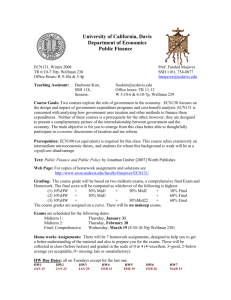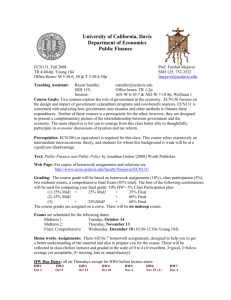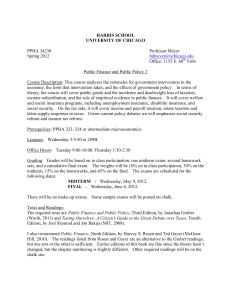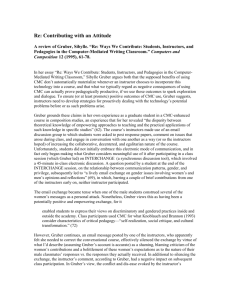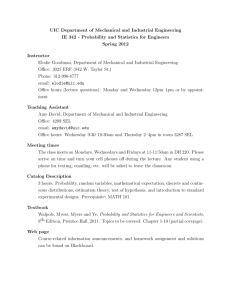Public Economics - Swarthmore College
advertisement
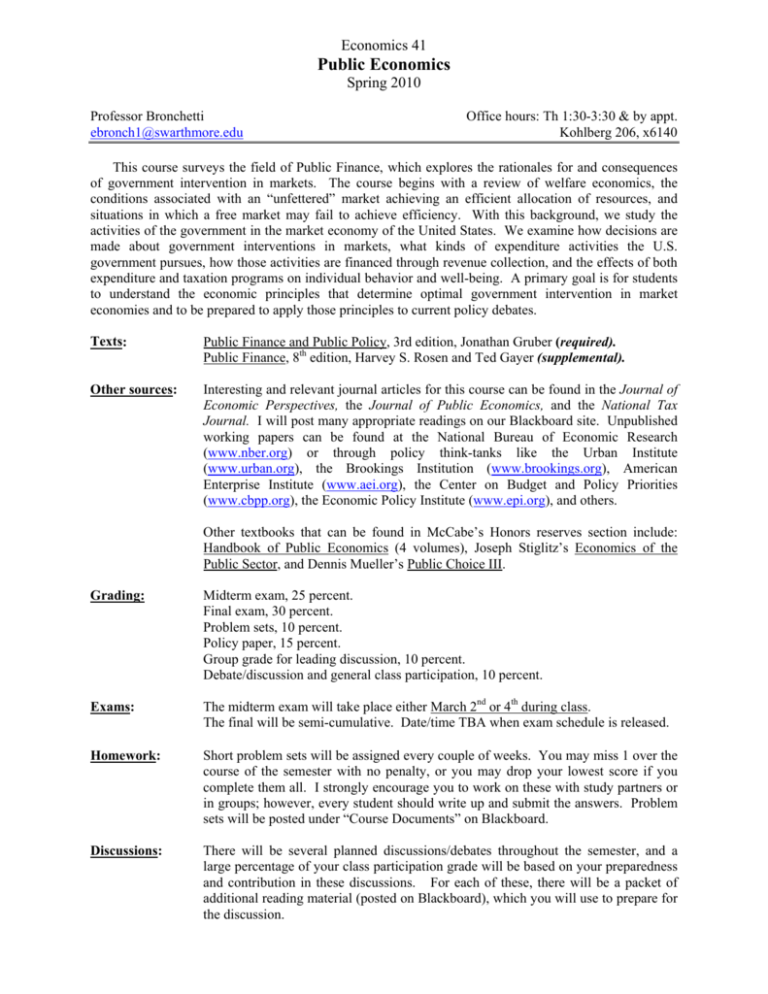
Economics 41 Public Economics Spring 2010 Professor Bronchetti ebronch1@swarthmore.edu Office hours: Th 1:30-3:30 & by appt. Kohlberg 206, x6140 This course surveys the field of Public Finance, which explores the rationales for and consequences of government intervention in markets. The course begins with a review of welfare economics, the conditions associated with an “unfettered” market achieving an efficient allocation of resources, and situations in which a free market may fail to achieve efficiency. With this background, we study the activities of the government in the market economy of the United States. We examine how decisions are made about government interventions in markets, what kinds of expenditure activities the U.S. government pursues, how those activities are financed through revenue collection, and the effects of both expenditure and taxation programs on individual behavior and well-being. A primary goal is for students to understand the economic principles that determine optimal government intervention in market economies and to be prepared to apply those principles to current policy debates. Texts: Public Finance and Public Policy, 3rd edition, Jonathan Gruber (required). Public Finance, 8th edition, Harvey S. Rosen and Ted Gayer (supplemental). Other sources: Interesting and relevant journal articles for this course can be found in the Journal of Economic Perspectives, the Journal of Public Economics, and the National Tax Journal. I will post many appropriate readings on our Blackboard site. Unpublished working papers can be found at the National Bureau of Economic Research (www.nber.org) or through policy think-tanks like the Urban Institute (www.urban.org), the Brookings Institution (www.brookings.org), American Enterprise Institute (www.aei.org), the Center on Budget and Policy Priorities (www.cbpp.org), the Economic Policy Institute (www.epi.org), and others. Other textbooks that can be found in McCabe’s Honors reserves section include: Handbook of Public Economics (4 volumes), Joseph Stiglitz’s Economics of the Public Sector, and Dennis Mueller’s Public Choice III. Grading: Midterm exam, 25 percent. Final exam, 30 percent. Problem sets, 10 percent. Policy paper, 15 percent. Group grade for leading discussion, 10 percent. Debate/discussion and general class participation, 10 percent. Exams: The midterm exam will take place either March 2nd or 4th during class. The final will be semi-cumulative. Date/time TBA when exam schedule is released. Homework: Short problem sets will be assigned every couple of weeks. You may miss 1 over the course of the semester with no penalty, or you may drop your lowest score if you complete them all. I strongly encourage you to work on these with study partners or in groups; however, every student should write up and submit the answers. Problem sets will be posted under “Course Documents” on Blackboard. Discussions: There will be several planned discussions/debates throughout the semester, and a large percentage of your class participation grade will be based on your preparedness and contribution in these discussions. For each of these, there will be a packet of additional reading material (posted on Blackboard), which you will use to prepare for the discussion. Although all students are expected to complete the readings and to contribute to discussions, a team of 5 or so students will be responsible for leading each of the discussions. The team leading the discussion will clearly need to devote more time to reading the materials, determining the major points that should come out of the discussion, and preparing questions to lead classmates through a productive discussion or debate of the topic. I will be available to consult with teams about how to prepare and lead a discussion. We will choose discussion topics and groups within the next week. Paper: The purpose of the writing assignment is to use what you've learned to evaluate a policy or reform of current importance. You will write a 6-8 page paper (excluding any references, graphs, or tables), which should be double-spaced in a font no smaller than 11-point. The most important tasks in writing the paper are to 1) briefly describe the program/policy, its intended effects, target population, etc., 2) relate it to the material and/or economic theory we've discussed in class, describing, where possible, the economic justification for this government intervention, 3) discuss and explain related policy debates, and 4) come to a conclusion concerning the value of the program in terms of its effects or the direction that policy makers should take in the future. Failure to take a stance and advocate an opinion (with respect to part 4) will result in a reduced grade, as will failure to support your opinion with economic reasoning. The last page of the syllabus provides some possible paper topics; however, you are free to choose another topic that interests you. Relevant deadlines for topic choice, preliminary bibliographies, and final papers are listed on the schedule. I will give you more detailed information on the paper shortly, but you should begin thinking about topics and looking for sources as soon as possible. Policies: Late assignments – If you turn in a term paper late, the grade will be reduced 1/3 of a letter grade for each day past the due date. Papers that are more than 5 days late will not be accepted at all. Problem sets are due at the specified deadline and will not be accepted late. You may, however, forfeit one problem set with no penalty. Grade Concerns/Appeals – If you feel that an assignment has been graded incorrectly, please submit a written explanation of the problem (along with the assignment) within one week. The written explanation may be very brief but should be clear enough for me to understand your concern about your grade. Alternatively, you may come to discuss the assignment and grade during my office hours. Missed exam – Regardless of the reason for missing an exam, no make-up will be given unless arrangements are made with me prior to the scheduled time of the exam and you provide documented evidence of a circumstance that merits rescheduling (e.g. a university-sponsored event or an illness certified by the Dean’s office or Worth). Final exams can be rescheduled only in accordance with the policies of the College (e.g., if you have three or more finals within a 24-hour period), but you must let me know as soon as possible if you will need to take the final at an alternate time. Travel plans are not sufficient reason for rescheduling of the final. Academic dishonesty – Plagiarism and other forms of academic dishonesty will be punished in accordance with the college’s policies and can involve penalties ranging from failing the course to expulsion from the college. Please see me if you have questions on how to avoid plagiarism in your writing assignments. ROUGH SCHEDULE Dates Topics Reading Problem Set 1 Jan. 19, 21 Introduction Theoretical Tools of Public Finance Gruber 1 Gruber 2 Rosen 3 Problem Set #1 up on Blackboard 2 Jan. 26, 28 Theoretical Tools of Public Finance, cont. Empirical Tools of Public Finance Budget Analysis Week Gruber 3 Gruber 4 3 Feb. 2, 4 Externalities DISCUSSION #1 Gruber 5, 6 4 Feb. 9, 11 Public Goods Cost-Benefit Analysis DISCUSSION #2 (Paper topics due Feb. 11 by 5 p.m.) Gruber 7 Gruber 8 5 Feb. 16, 18 Political Economy DISCUSSION #3 Gruber 9 Rosen 6 6 Feb. 23, 25 Fiscal Federalism and Education (Bibliographies due Feb. 25 by 5 p.m.) DISCUSSION #4 Gruber 10 Gruber 11 7 Mar. 2, 4 MIDTERM EXAM Mar. 9, 11 SPRING BREAK 8 Mar. 16, 18 Social Insurance UI, SSDI, and WC Gruber 12 Gruber 14 9 Mar. 23, 25 Social Security DISCUSSION #5 Gruber 13 10 Mar. 30, Apr. 1 Health Insurance, Medicaid and Medicare DISCUSSION #6 Gruber 15 Gruber 16 11 Apr. 6, 8 Income Redistribution, Poverty and Welfare DISCUSSION #7 Gruber 17 Rosen 13 12 Apr. 13, 15 Tax Incidence and Efficiency DISCUSSION #8 13 Apr. 20, 22 Taxes on Labor Supply and Savings Taxes on Risk-taking and Wealth DISCUSSION #9 Gruber 18 Gruber 19 Gruber 20 Gruber 21, 22 Gruber 23 14 Apr. 27, 29 Tax Reform Wrap up, catch up and/or review (Papers due Monday, May 3, by 5:00 p.m.) Gruber 25 Problem Set #2 up on Blackboard Problem Set #3 up on Blackboard Problem Set #4 up on Blackboard Problem Set #5 up on Blackboard Problem Set #6 up on Blackboard SOME POSSIBLE PAPER TOPICS 1. Carbon taxes and cap-and-trade proposals 2. Fuel economy (CAFÉ) standards for automobiles 3. Government subsidies to professional sports franchises or for stadiums 4. Government response to natural disasters (i.e., How ought the government respond?) 5. Head Start and its effects 6. School expenditures, class size, and student performance 7. Accountability-based education reform and/or No Child Left Behind 8. Unemployment Insurance (UI) reform 9. Social Security Old Age Benefits, solvency and possible reforms 10. State Children’s Health Insurance Program (SCHIP) 11. U.S. healthcare and health insurance in comparative perspective 12. Universal health insurance in the U.S. 13. Welfare Reform of 1996 (PRWORA), its goals and effects 14. The Earned Income Tax Credit (EITC) and its effects 15. The Bush tax cuts, their effects and the current debate 16. “Fair Tax” – national sales tax or consumption taxes in general
